Reef Fisheries Status
Fisheries play an important role in both poverty prevention and poverty reduction. ref They provide an important safety net for people when other sources of employment are unavailable or following natural disasters. Globally, over 6 million fishers and gleaners are employed in coral reef fisheries. ref
Almost 3 billion people (40% of the world’s population) live within 100 kilometers of the coast ref and global coastal populations are expected to double by 2025. ref As populations steadily increase along coastlines near coral reefs, additional stress is put on coral reef ecosystems and coral reef fish are decreasing in number all over the world, a trend also seen in commercial fisheries.
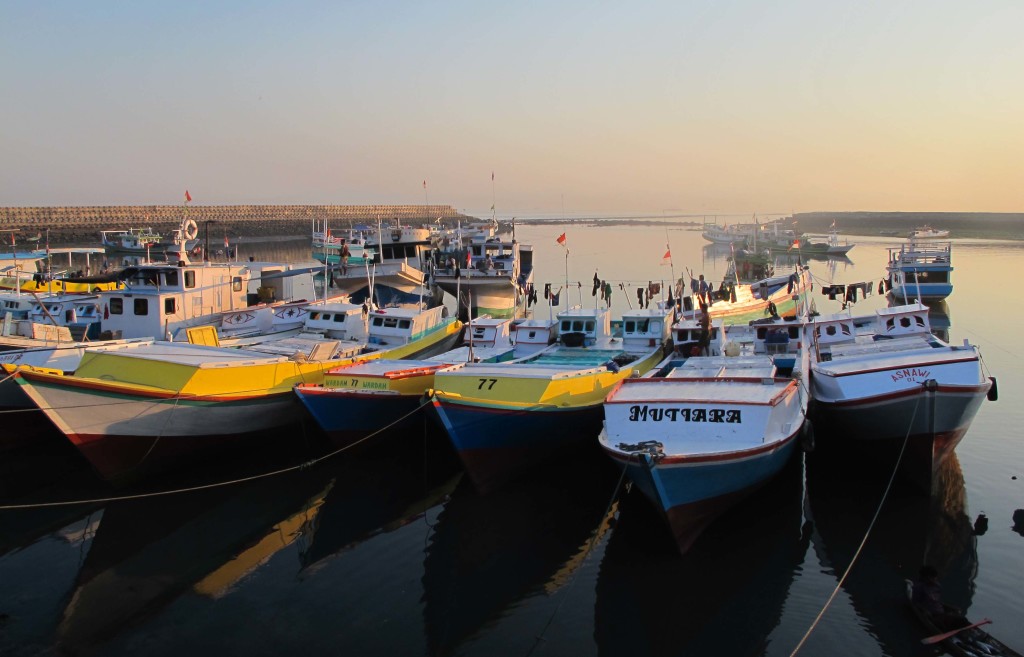
Many fishing fleets have grown near coral reefs all around the world, catching more fish than coral reef ecosystems can support. Photo © Elle Wibisono
There are several reasons for the decline in fish numbers, including (but not limited to) diseases, pollution, unsustainable fishing practices, and particularly overfishing.
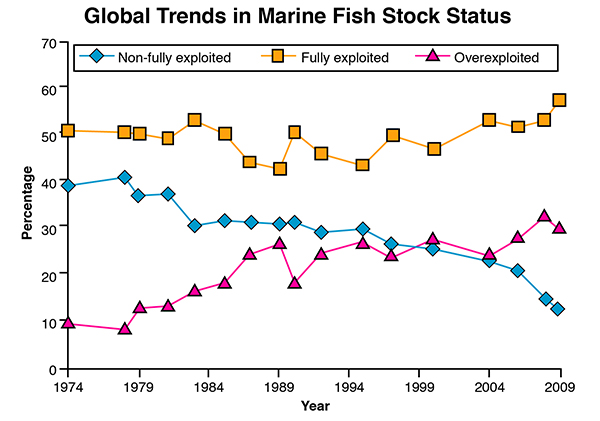
Global Trends in Marine Fish Stock Status from 1974 to 2009. The number of overexploited stocks has soared since the 1970s, while the number of non-fully exploited stocks has decreased. The number of overexploited fisheries is likely to continue to increase. ref Source: The Food and Agricultural Organization of the United Nations.
Coral reefs are essential habitat that support coral reef fisheries, and yet more than 60% of the world’s coral reefs are under immediate and direct threat from human activities including overfishing. ref Overfishing is defined as catching more fish than the system can support. Overfishing has serious consequences, particularly for coral reefs, as some fish species (e.g., herbivores) are critical in maintaining coral reef ecosystem processes. Destructive fishing methods such as using dynamite and cyanide are highly unsustainable because they typically do not target particular fish species and often result in juveniles being killed in the process. Damage to the coral reef structure further reduces the productivity of the area, thus adversely affecting both the reef-dependent fish populations and also the livelihoods of fishers and nearby communities.
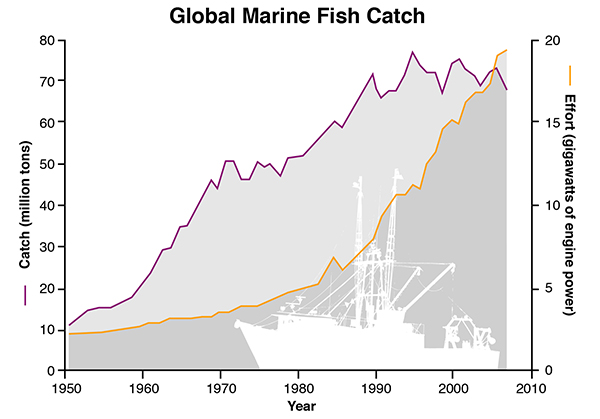
Global Marine Fish Catch from 1950 to 2010. Over 90% of the world's assessed fisheries have met or exceeded their biological limits (FAO, 2014). While the global reported catch has leveled out since the early 1990s, fishing effort has steadily increased since the 1970s, suggesting stock declines in most fisheries. The global fish catch (purple line) has declined in recent years, even though fleets are spending more effort (orange line) to catch fish. Source: Sea Around Us Project.
Causes of Overfishing
More Efficient Fishing Methods/Technologies that Take More Fish Before They Can Reproduce
More efficient fishing methods and technologies have resulted in taking more fish before they can reproduce. Technological improvements in fishing power and efficiency reduce the cost of catching fish. Fishing power has increased due, in part, to more powerful engines capable of transporting larger vessels, and increased affordability and options of fishing gear. ref Technological advances in the design of fishing gear and navigation equipment have increased the efficiency of fishing. This significantly increases fishing capacity by encouraging new people to join the fishery, which results in further depletion of stocks. Stock depletion in turn spurs technical innovation and improvements in technological efficiency, which leads to a vicious circle of innovation, demographic pressure, scarcity, and so on. ref
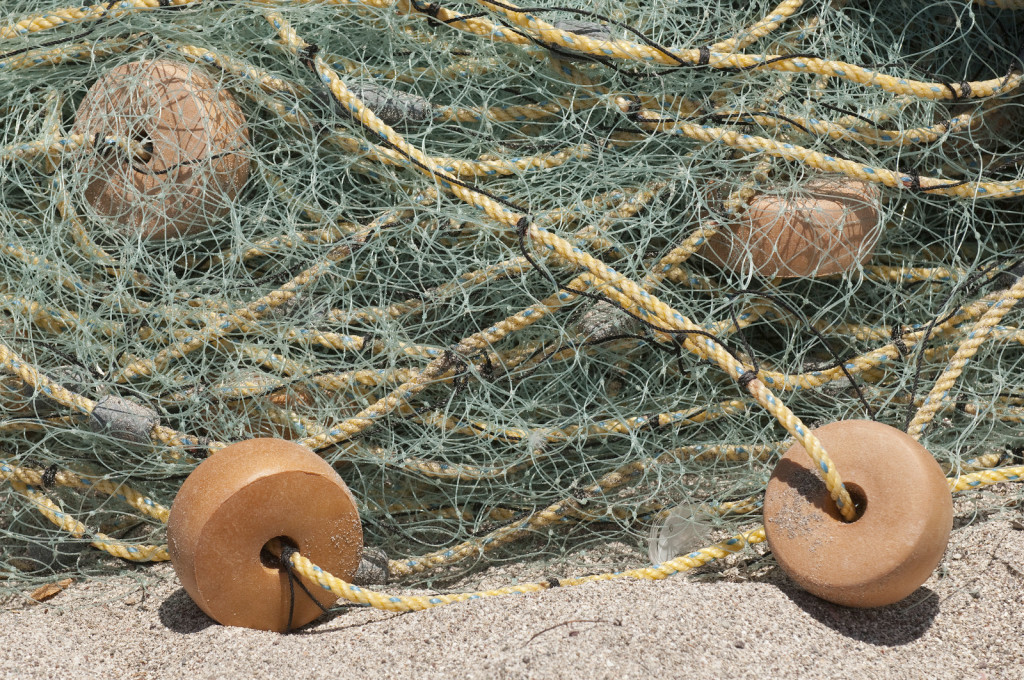
Fishing net with floats lays on the beach at a small indigenous fishing camp on the shore of Isla Espiritu Santo in Mexico's Sea of Cortez. Photo © Mark Godfrey
Inadequate Management and Enforcement of Fishing Practices
In the developed world, many large commercial fisheries are healthy or rebuilding, and are under some form of management. ref Most small-scale coral reef fisheries, however, are typically unassessed and unmanaged. Stocks are generally below optimal biomass levels and fishing effort remains too high to maintain healthy fisheries. The fishery management capacity is inadequate throughout most, though not all, of Asia, Africa, and South and Central America. Many fisheries in these areas lack the management capacity and resources, and in some cases the management institutions necessary to prevent overfishing. Additionally, coral reef fisheries often have multiple harvested species, multiple gear types, and numerous landing ports that complicate monitoring and enforcement. Read more about Fisheries Enforcement.
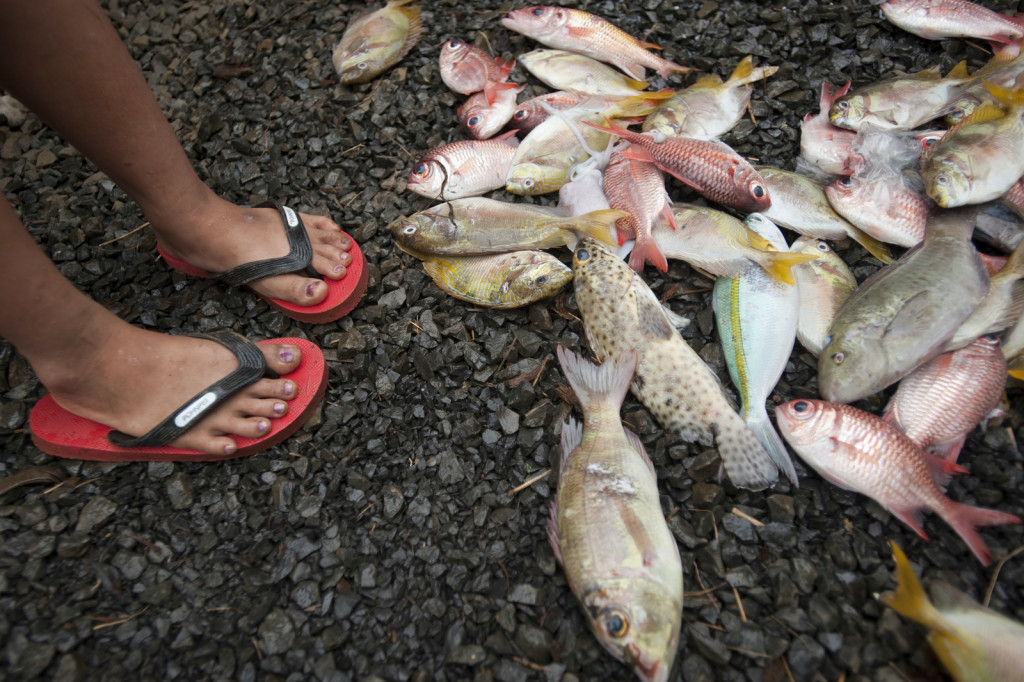
Lack of management can lead to overfishing and smaller fish in the catch. Members of the Paulino family (Enipein Village in Pohnpei, Federated States of Micronesia) examine their catch some of which they will sell to other members of their village community. Fishermen will often catch extra fish so that they can sell what they can't eat to generate additional income for their families. There is growing concern among the Pohnpeian government and conservation community that the increasing commercialization of Pohnpei's reef fisheries is leading to unsustainable resource utilisation and a declining fish population. Photo © Nick Hall
Lack of Alternative Livelihood Options in Many Coastal Communities
Many small-scale fishing communities that directly depend on fisheries have few alternative livelihood options, leading to excessive pressure on fishery resources. “In many parts of Africa, small-scale fisheries and related activities (trade, processing) provide income to rural communities where alternative employment opportunities are scarce or even non-existent. In these situations, small-scale fisheries, fish processing, and trade provide people with an important, and sometimes crucial, form of safety net that helps protect them against the effects of agricultural product price volatility, macro-economic crises, structural reforms, harvest failures, political turmoil, and other factors that threaten rural stability and food security.” - WorldFish Center
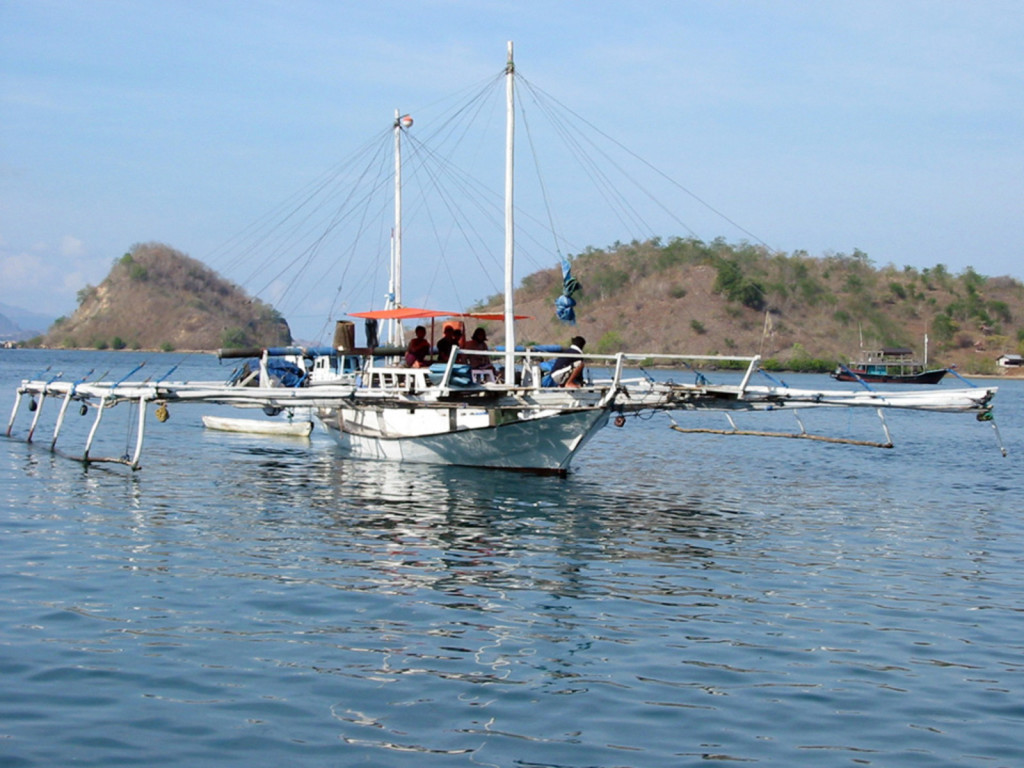
Local 'bagan', a light-attraction lift net fisher, in the Labuan Bajo harbour of Komodo National Park in Indonesia. Photo © Peter Mous
Impact of Overfishing
Overfishing can lead to decreases in both target and non-target fish populations, even to the point of extinction. It can also have an ecosystem-wide impact (e.g., changes in species assemblages due to reduction in/elimination of predators or prey populations). Additionally, some fish species (e.g., herbivores) are important for the function of coral reef ecosystems. If these species are depleted, the reef system may change from coral to algal dominance.
Overfishing also has a significant impact on dependent human communities. For example, over 275 million people live in close proximity to coral reefs, where livelihoods are likely to depend on reefs. A healthy, well-managed reef can yield between 0.2 and 40 tons of seafood per square kilometer annually globally. ref Threats to fish stocks and coral reef ecosystems can directly affect the livelihoods of coastal communities.
